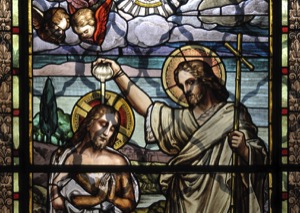
As a progressive Christian, I believe there are many names for God and many ways to a loving God; this article reflects one of those ways. Take from here what works for you. Celebrate life with joy and peace!
Recalling our baptism is very meaningful for many of us. I remember, way back in 1969, on a summer Sunday night in Madison, Wis., at Evangel Temple church, I was baptized in the tradition of my church – full immersion, in the dunk tank behind the choir loft. There’s something powerful about it – not just the event, but the meaning attached to it.
Today, we recall Jesus’ baptism as recorded in the gospel of Luke. Let’s put it into context, and remember that the Jewish John the Baptist, baptizing Jewish Jesus, was not something that was in the local synagogue bylaws for the Christian sacrament of baptism as we know it today.
Not all Christians observe baptism. The Salvation Army doesn’t offer an ordinance of baptism. Quakers, also, do not have a baptismal ritual, but believe that real baptism is a life following the teachings of Jesus.
The Christian Science statement about baptism says, “We emphasize the meaning behind a Christian symbol more than the outward practice of a symbolic act. We practice baptism daily by studying the Word of God and living our lives in a way that gives evidence that we are being bathed in Spirit.” Unitarian Universalists usually offer child dedication ceremonies rather than baptism, and they don’t require baptism for membership.
So, when we are speaking about baptism, we need to realize that we don’t all have the same experience or understanding of it.
Baptism, as a rite of passage, is an affirmation of our place in the spiritual community. Baptism is a symbol of divine Love with and within us, never to let us go, is beautiful. Whatever ritual that John the Baptist was offering is not necessarily the one that we hold onto today.
Baptism, for me, doesn’t wash away original sin, nor is it the ritual that allows us status into an elite spiritual club, nor is it a magical rite that assures us of an enjoyable life after this one comes to an end.
Baptism is, for me, a conscious experience, an awareness that we are connected to God, and that we are called to contribute to, share the gifts, talents, passions and skills that we have. In other words, baptism reminds us that God’s light is within us, and then calls us to let that light shine.
The timeline of Jesus beginning his ministry with baptism can be seen as an allegory for how all of us can be immersed in a greater awareness of an omnipresent God, identifying ourselves as children of God, and feeling called to share ourselves in creative and practical ways to bless our spiritual community and our world.
This spiritual baptism can be celebrated in many different forms because the ritual is merely an outward sign of an inward event. And it is the inward event that’s most important. It’s the awareness of God with, in and expressing through us, that is most valuable.
A sacrament isn’t a magical spell that makes something happen; it is an outward sign of an inward grace, and grace is freely given, it is not held from anyone, it can neither be earned, nor lost.
Grace, which is unmerited favor, unconditional love, is simply the reality that divine life is our life; it flows through us, it expresses as us, and it will never and can never abandon us.
So, baptism isn’t about how much water we use, or the age of the person getting baptized. It’s about the decision to consciously follow in the footsteps of Jesus. It’s about taking his life and teaching seriously. It’s about a divine affirmation of our innate goodness. And it’s never too soon, and it’s never too late to celebrate that gift.
Following baptism, Jesus begins his ministry. Baptism is a beginning, a launching pad, a calling forth, a word of encouragement as one is sent out to do something.
I like what Biblical scholar, David Lose says, “And this is where these stories of Jesus’ baptism intersect with the stories of our own. For we, too, can only live into the mission that God has set for us to the degree that we hear and believe the good news that we, too, are beloved children of God. As with Jesus, we discover in baptism who we are by hearing very clearly whose we are. Baptism is nothing less than the promise that we are God’s beloved children. That no matter where we go God will be with us. That no matter what we may do, God is for us and will not abandon us. In baptism we are blessed with the promise of God’s Spirit…”
Baptism doesn’t make that happen; baptism is the celebration that it is already, and forever will be, true. We are loved and our lives are sacred.
That’s baptism. The water is a “party favor,” as it were, but the party itself is the experience of God as our very life, the love that will not let us go, and the omnipresent power that is always with and within us, the eternal love in which we are forever immersed.
Rather than putting a lot of energy into the baptism ritual itself, let’s focus on baptismal living. Let’s focus on the transformational experience of being aware that we are immersed in God, forever connected with God, as God’s precious children, with whom God is well pleased.











